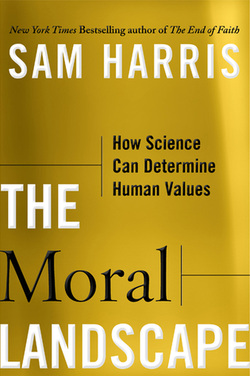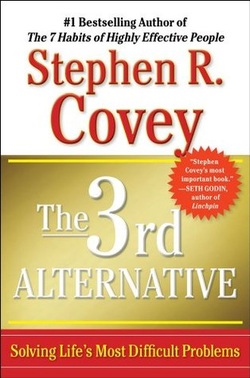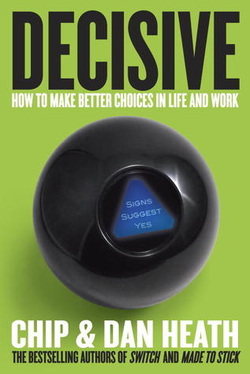
Sam Harris does a masterful job of setting up the need, the value and the rationale for his premise -- that Science can serve as the neutral referee in a moral landscape so presently marked by polarization. He then, in the precision that only a neuroscientist could bring to bear, spends the rest of the book undercutting and unwittingly disproving his thesis. Largely by being unscientifically blinded to his own prejudices, Harris sets up the strawdog of religion to his science talisman. He refers to faith-based religion as "that great engine of ignorance and bigotry." For every neuro-transmitter Harris identifies, there are equal parts leap of faith to some future "provable" fact. The people who must act in this moral landscape are in essence being asked to trade in their priests, mullahs and televangelists for a new set of all-knowing arbiters. (With a hell of a lot more jargon, to boot.) In this way, Harris is skipping down the path Christopher Hitchens plowed in his "God is not Great."
What is one to make of this? Quite a bit, I think. For I believe, Harris' description of the moral landscape we confront today is powerful and instructive in its own right. If we come at it from a different scientific vein -- the anthropologist -- to understand rather than to impose a different/substitute moral order, I think Harris has helped us see the flaws in our present rubrics without having to embrace an equally inadequate set of commandments.
Let us look at the trap of moral loggerheads we face in western societies. Harris cites Christian v. Secular in the US and Muslim v. Irreligious in Europe as the polar ends of the conservative - liberal, right - left continuum. Unfortunately, it has grown to be much less continuum and more a valley separating two uncompromising peaks. If from the right the authority is God, then there are right answers to questions of meaning and morality. Meanwhile, the left with the preponderance of postmodernism in the Universities seems to hold that no objective right answers exist.
Thus, on the one side you have religious correctness for even the wrong action, while on the left you have profound doubt leading to inaction. Knowing what the creator envisioned empowers the right to impose; not knowing or doubting anything can be right, forces the left to surrender and lay supine in the face of the "right." Religion defines moral right in terms of a hereafter reward versus human benefit in this world. Present suffering doesn't matter. In fact, it is seen as cleansing them of their sins. Harris thus explains how a suicide bomber or a pope denying contraception to the poor are just different points on the same religious mandala.
It seems to me that instead of attacking the "hereafter" focus of religion and seeking to substitute the calculations and prescriptions of science as the trier-of-fact in our set of moral hazards, wouldn't it serve to look at the other side of that "hereafter v. present human impacts equation" and seek to make clear and potent the human benefit/detriments of decisions. If loss aversion is at the root of conservatism and this compels an acceptance of social inequality, wouldn't the more appealing approach be to demonstrate how benefiting "those" folks redounds to all of our self-interests. If one is not able to reconcile the tension between personal and collective wellbeing, there is still no reason to believe that they are generally in conflict. Isn't that what Henry Ford, that paragon of conservatism, did with the $5 / day wage? Isn't that the apolitical "outcome challenge" we are seeing in a growing number of communities?
Attacking religious over-reach in service of the hereafter sets up the wrong manifesto. In fact, it plays into the "limits mentality" to the extent that the most powerful societies on earth spend their time debating issues like gay marriage and immigration instead of nuclear proliferation, genocide, energy security, climate change, poverty and failing schools. Rather shouldn't the left be more focused on actually achieving something with clarity and transformative human benefit so that it can leaven the narcotic of a thousand virgins with the glory of now.
What is one to make of this? Quite a bit, I think. For I believe, Harris' description of the moral landscape we confront today is powerful and instructive in its own right. If we come at it from a different scientific vein -- the anthropologist -- to understand rather than to impose a different/substitute moral order, I think Harris has helped us see the flaws in our present rubrics without having to embrace an equally inadequate set of commandments.
Let us look at the trap of moral loggerheads we face in western societies. Harris cites Christian v. Secular in the US and Muslim v. Irreligious in Europe as the polar ends of the conservative - liberal, right - left continuum. Unfortunately, it has grown to be much less continuum and more a valley separating two uncompromising peaks. If from the right the authority is God, then there are right answers to questions of meaning and morality. Meanwhile, the left with the preponderance of postmodernism in the Universities seems to hold that no objective right answers exist.
Thus, on the one side you have religious correctness for even the wrong action, while on the left you have profound doubt leading to inaction. Knowing what the creator envisioned empowers the right to impose; not knowing or doubting anything can be right, forces the left to surrender and lay supine in the face of the "right." Religion defines moral right in terms of a hereafter reward versus human benefit in this world. Present suffering doesn't matter. In fact, it is seen as cleansing them of their sins. Harris thus explains how a suicide bomber or a pope denying contraception to the poor are just different points on the same religious mandala.
It seems to me that instead of attacking the "hereafter" focus of religion and seeking to substitute the calculations and prescriptions of science as the trier-of-fact in our set of moral hazards, wouldn't it serve to look at the other side of that "hereafter v. present human impacts equation" and seek to make clear and potent the human benefit/detriments of decisions. If loss aversion is at the root of conservatism and this compels an acceptance of social inequality, wouldn't the more appealing approach be to demonstrate how benefiting "those" folks redounds to all of our self-interests. If one is not able to reconcile the tension between personal and collective wellbeing, there is still no reason to believe that they are generally in conflict. Isn't that what Henry Ford, that paragon of conservatism, did with the $5 / day wage? Isn't that the apolitical "outcome challenge" we are seeing in a growing number of communities?
Attacking religious over-reach in service of the hereafter sets up the wrong manifesto. In fact, it plays into the "limits mentality" to the extent that the most powerful societies on earth spend their time debating issues like gay marriage and immigration instead of nuclear proliferation, genocide, energy security, climate change, poverty and failing schools. Rather shouldn't the left be more focused on actually achieving something with clarity and transformative human benefit so that it can leaven the narcotic of a thousand virgins with the glory of now.
To be tweeted links to my new posts -- blog, book reviews (both nonfiction and fiction), data or other recommended tools -- either go to Twitter.com and follow me @jcrubicon, or just go to my Home page and click on the Twitter button on the right, just above the tweet stream, and follow me @jcrubicon.


 RSS Feed
RSS Feed
